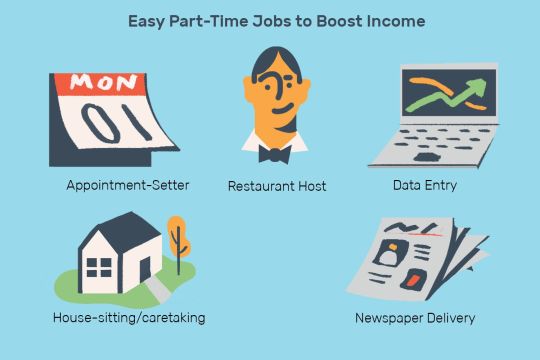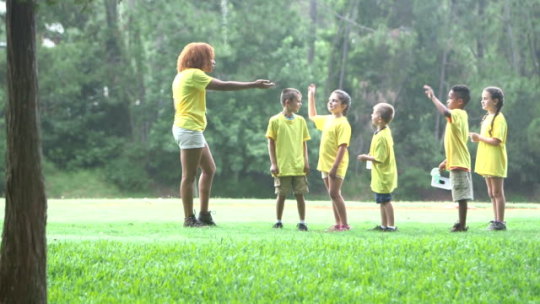Text
Part-Time Jobs for 17-Year-Olds: The Ultimate Guide to Earning While Learning!
Introduction
Ah, the sweet taste of independence – it's finally time to earn your own money and take a step into the world of part-time jobs! If you're a 17-year-old with the desire to make some dough, gain valuable work experience, and still manage your school commitments and social life, you're in the right place.
This article is your gateway to understanding the ins and outs of part-time jobs for 17-year-olds. We've got your back, providing insights into various job opportunities, the skills you'll gain, and tips on balancing it all. Let's dive in!

Why Should 17-Year-Olds Consider Part-Time Jobs?
Before we jump into the exciting world of part-time employment, you might wonder: Why should you consider getting a job at 17?
Financial Freedom: Having your own income means you can start saving, buy the things you want, Publix training website or treat yourself to a night out with friends. It's a taste of financial freedom!
Valuable Experience: Part-time jobs offer more than just money. They equip you with essential life skills like time management, communication, and problem-solving, making you a more well-rounded individual.
Career Exploration: It's a great opportunity to explore different career paths. You'll gain insight into industries you might be interested in pursuing in the future.
Independence: As you transition into adulthood, having a part-time job fosters a sense of responsibility and independence. You learn to balance work with other life commitments.
Social Skills: Interacting with colleagues, supervisors, and customers helps develop strong social skills. These skills will serve you well in all areas of life.
Types of Part-Time Jobs for 17-Year-Olds
Now, let's explore the vast array of part-time job opportunities waiting for you:
Retail Jobs
Working in retail is a fantastic way to develop your customer service and sales skills. Positions often include cashier, sales associate, or stock clerk.
Food Service Jobs
If you enjoy the fast-paced environment of restaurants and cafes, you can work as a server, host/hostess, or barista. It's a great way to improve your communication and multitasking skills.
Babysitting
Babysitting can be a rewarding job for a 17-year-old. It's flexible and allows you to earn while taking care of children. Plus, it's an opportunity to learn responsibility and patience.
Lifeguard
If you're a strong swimmer and enjoy being by the pool, consider becoming a lifeguard. It's a part-time job that combines responsibility with fun.
Tutoring
If you excel in a particular subject, consider offering your expertise as a tutor. You can help younger students while brushing up on your own knowledge.
Pet Sitting or Dog Walking
If you're an animal lover, pet sitting or dog walking is an enjoyable way to earn money. It's flexible, and you get to spend time with furry friends.
Grocery Store Jobs
Positions like bagging groceries, stocking shelves, or working in the produce department Exploring the Exciting World of Summer can provide steady part-time work.
Skills You'll Develop
Part-time jobs aren't just about earning money; they're also about personal and professional growth. Here are some valuable skills you'll develop:
Time Management: Balancing work, school, and social activities teaches you how to manage your time effectively.
Communication: You'll become an excellent communicator, whether it's with customers, coworkers, or your boss.
Problem-Solving: Dealing with challenges at work hones your problem-solving skills.
Responsibility: Part-time jobs teach you to be responsible, accountable, and reliable.
Teamwork: You'll work as part of a team, learning how to collaborate and support your colleagues.
Customer Service: Jobs that involve customer interactions enhance your customer service skills.
Balancing Work, School, and Life
Juggling work, school, and your personal life can be a challenge, but it's entirely manageable. Here are some tips to help you maintain a healthy balance:
Create a Schedule: Plan your work hours, study time, and social activities on a weekly schedule. This helps you stay organized and prevents overcommiting.
Prioritize Tasks: Identify your most important tasks for school, work, and your personal life. Prioritizing ensures that you address critical responsibilities first.
Set Realistic Goals: Be realistic about how much you can handle. Don't overwork yourself – it's okay to take a break and relax.
Communicate: Let your employer and teachers know about your commitments. Many employers and educators are understanding and can offer flexibility.
Stay Organized: Use tools like calendars, planners, or smartphone apps to stay organized and keep track of your obligations.
0 notes
Text
Exploring the Exciting World of Summer Camp Counselor Jobs for 16 Year Olds!
Introduction
Hey there, all you adventurous teens out there! It's time to swap the boredom of summer TV marathons for something that'll rock your world: summer camp counselor jobs for 16 year olds. If you're eager to add a dose of excitement and personal growth to your summer, you've come to the right place. Get ready to embark on a journey where fun, friends, and lifelong memories await you!
So, what's the deal with these summer camp counselor jobs for 16 year olds, you ask? Well, we've got all the juicy details, insider tips, and answers to your burning publix training website questions right here. Buckle up because this article will take you through the wild ride of becoming a camp counselor and the incredible adventure that awaits you. Let's get started!

Why Be a Summer Camp Counselor at 16?
Are you wondering why in the world you should consider a summer camp counselor job at the ripe age of 16? Well, let's break it down, shall we?
Adventure Awaits: First off, being a camp counselor at 16 is like getting a golden ticket to an adventure-filled summer. It's not your average job; it's an experience that's bound to be packed with excitement, challenges, and unforgettable moments.
Personal Growth: If you're looking to level up your life skills, this is it! Camp counseling hones your leadership, communication, and problem-solving skills. You'll come out of it as a more confident and capable individual.
New Friends: Picture this – you'll be surrounded by like-minded folks who are just as thrilled about summer as you are. Friendships made at summer camp can last a lifetime. It's the ultimate way to broaden your social horizons.
Disconnect to Reconnect: In an era of screens and social media, camp provides a chance to unplug and embrace the great outdoors. You'll learn to appreciate the beauty of nature, free from the constant ping of notifications.
Valuable Experience: Being a camp counselor isn't just fun and games. It's a great resume builder, showing future employers and colleges that you're responsible and capable of managing a group of energetic kids.
How to Land Your Dream Summer Camp Counselor Job
Now that you're all pumped up about the idea of being a camp counselor, let's dive into the nitty-gritty of how to snag that dream job.
Search Early: Summer camp positions tend to fill up quickly, so start your search early, even before the snow has melted. Websites, social media, and good old-fashioned networking are your best friends in this process.
Prepare a Killer Resume: You're young, but you can still make your resume shine! Highlight any relevant experience, such as babysitting, sports coaching, or even volunteering. Include your hobbies and interests – they might be just what a camp is looking for!
Craft a Standout Cover Letter: Your cover letter is your chance to shine. Be genuine and let your passion for the job shine through. Explain why you want to be a camp counselor and what makes you the ideal candidate.
Get Ready for Interviews: Interviews can be nerve-wracking, but they're also an opportunity to showcase your enthusiasm and personality. Be ready to share stories of how you've dealt with challenges or worked in a team.
Complete Training: Many camps provide training for their staff. If you're selected, make sure to complete it thoroughly. This might include CPR certification, child safety training, and team-building exercises.
The Life of a Camp Counselor: A Day in the Woods
Let's talk about what it's really like to be a camp counselor! Expect the unexpected, but here's a glimpse into your future life in the great outdoors.
Mornings
Early Bird Catches the Worm: Rise and shine! Your day starts early, often with a hearty breakfast. The campers will be up soon, so you'll want to be prepared.
Morning Meeting: Gather around with your fellow counselors to plan the day's activities, assign tasks, and get into the camp spirit.
Campfire Stories: Sometimes, you'll get the kids around the campfire for some stories and songs. This is where camp magic truly happens.
Afternoons
Activity Time: Get ready for a whirlwind of fun – from archery to arts and crafts, and everything in between. You'll lead, assist, and ensure everyone's having a blast.
Lunch Break: Even superheroes need to eat. Enjoy a well-deserved lunch with your fellow counselors and campers. Sharing stories and jokes is a must!
Free Time: Campers might have some free time to explore and play. Keep an eye out for safety and join in on the fun when you can.
Evenings
Campfire Again! Gather around the fire pit for evening campfire sessions. This is a time for reflection, sharing, and creating memories that will last a lifetime.
Bedtime Stories: After a day filled with adventures, it's time to tuck the campers into their sleeping bags and share a bedtime story.
Counselor Bonding: Wind down with your fellow counselors, exchanging stories and enjoying the camaraderie of camp life.
FAQs: All Your Burning Questions Answered
We know you're curious, so here's a quick rundown of the most frequently asked questions about summer camp counselor jobs for 16 year olds!
Q1: What's the right age to become a camp counselor?
A1: Typically, most summer camps start hiring counselors at 16 or 17 years old. It's a perfect age to transition from camper to counselor.
Q2: Do I need any special skills to be a camp counselor?
A2: While specific skills are a bonus, a positive attitude, willingness to learn, and a love for the outdoors are often the most important qualities.
Q3: How do I handle homesickness if it kicks in?
A3: Homesickness is normal, even for counselors. Talk to fellow counselors or camp directors for support, and remember that it gets easier with time.
Q4: Will I get paid for being a camp counselor?
A4: Yes, most camp counselor positions are paid. It varies from camp to camp, but you'll usually receive room, board, and a salary.
Q5: Can I still have time for my friends and family during the summer?
A5: Camps often have time off during the week or specific days when you can catch up with loved ones. It's a balance you'll learn to strike.
The Bond You'll Forge: Camp Friends are Lifelong Friends
One of the most incredible aspects of being a camp counselor is the friendships you'll create. The bonds you form with fellow counselors and campers will last a lifetime.
1 note
·
View note